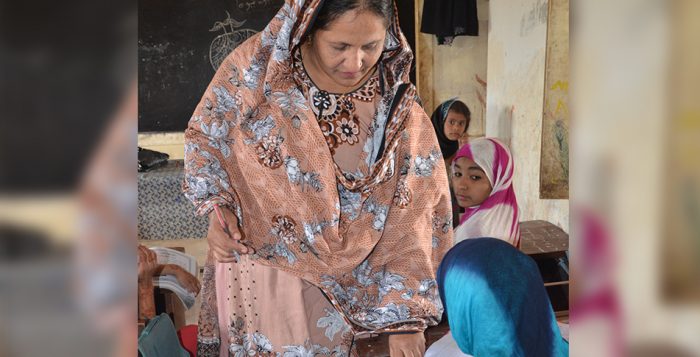Trained Teachers lead to motivated classrooms
Improving teachers’ skills and knowledge is seen as one of the most important investments, of time and resources, that local, state, and civil leaders can make to education.
expressed Hameeda Memon, a 42 years old teacher at the Government Girls Primary School, Civil Hospital, Thatta.“The Teachers Training and the Master Teacher Training conducted by Community World Service Asia, was a new experience of professional development for us. With its focus ranging from classroom processes and structures to teachers’ personal and teaching traits, it taught us a lot. It was a learning opportunity for us teachers that was explicitly aimed at enhancing teaching skills and increasing student achievement,”
Hameeda has been teaching for 23 years and has always been passionate about teaching.
“I was not familiar with the various teaching methods I learnt at the training. Our students have mostly been engaged in mindless memorization. The lessons were not properly understood and the students studied enough to achieve passing marks only. I wanted the students to enjoy their work but was unable to encourage them towards building interest in academic books,” added Hameeda, “In the teachers training, we were taught various theories and methodologies like students. We were the students this time. Morning meeting exercises and role play activities were conducted. We engaged in group activities and learnt how to develop low and cost no learning material. All this involvement through the interactive exercises increased our interest in teaching. That was when I realized how important it is to engage students in practical activities like these to keep their minds and bodies fresh to comprehend lessons better and achieve greater outcomes.”
Sessions on Gender education and Health Hygiene and Environment were the most informative and appealing content for Hameeda.
“It was the first time for me to learnt about these topics. We all were aware of the terms but we never studied them in our context. I now believe that these topics should be included in the curriculum to increase student’s knowledge on it as well. Teachers’ should emphasize on gender education and hygiene like they do on discipline and class work.”
Hameeda feels more confident and prepared about our classes after receiving the training.
“The Master Teacher Training was more about teaching methods and adult learning. It focused on planning and reporting skills of teachers for better class presentation and school management. These trainings have influenced our classroom practices significantly and have lead to improved student achievement. Zia, a student in my class, was very weak in her studies. She rarely spoke in the class and had difficulty in understanding her lessons. After the morning meetings and role plays, she started to speak up and participate in conversations. Today, she sits in the first row of the class and manages the black board and charts displayed in the classroom. Likewise, I have given other students certain responsibilities for classroom management. This ownership has motivated students to be more attentive.”
concluded Hameeda with a positive attitude.“Learning is a continuous process; more learning leads to better results. Even as teachers, we have a lot to learn and there is always room for improvement. If we are trained, we will deliver our lessons efficiently and more effectively, with the result being, our students benefiting in the long run. In addition, the reputation of the school will improve and the enrolment of students will increase. It’s a cycle of improvement at every stage. That’s why trainings like these should be an on-going process,”







